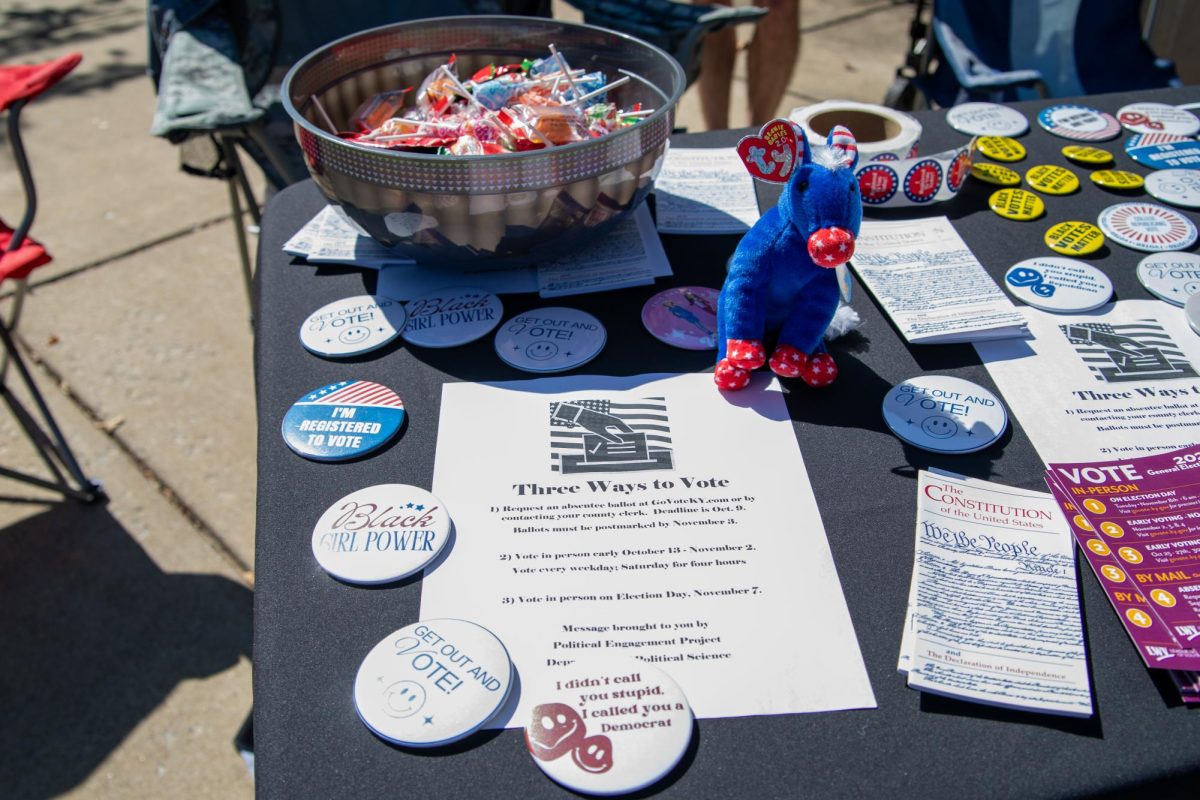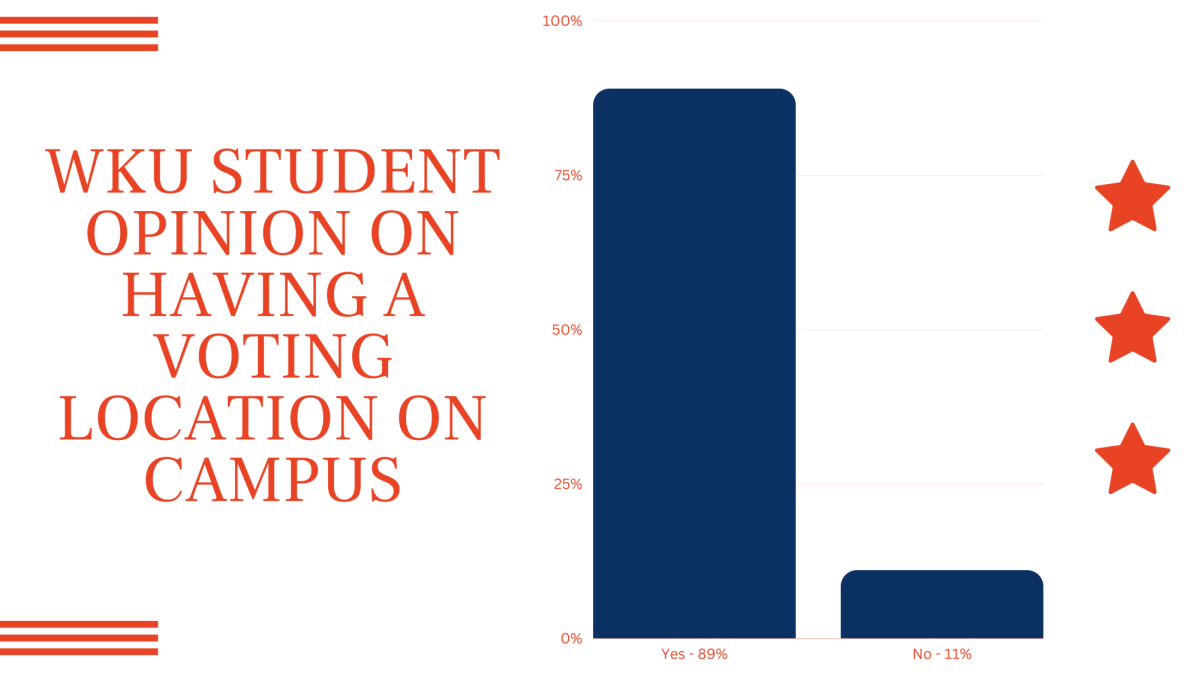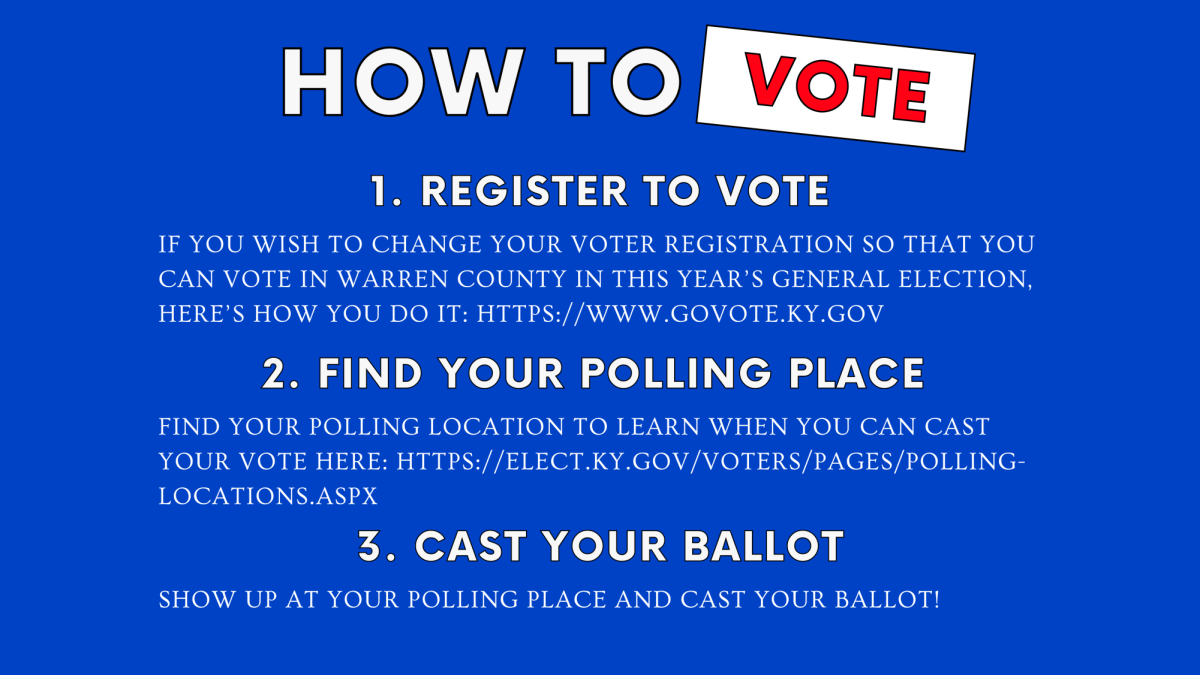The deadline to register to vote in this year’s general election is Oct. 10, and there are many key elements students must be aware of before going to the polls this election cycle.
Democratic Kentucky Governor Andy Beshear is up for reelection, challenged by current Republican Attorney General Daniel Cameron.
All Kentucky constitutional offices are included on the ballot this election year, such as Lieutenant Governor, Commissioner of Agriculture and more.
Kentucky has 3,476,659 registered voters as of August, according to the Kentucky State Board of Elections. 1,527,360 of those voters are registered Democrat while 1,597,434 are registered Republican.
In Warren County, a total of 92,083 people out of the approximately 140,000 citizens are registered voters. Republicans total 41,413 while Democrats total 40,070, Warren County Clerk Lynette Yates said.
In 2020, due to the COVID-19 pandemic, Warren County moved away from closed precinct voting locations to large voting centers where voters can cast their ballot at any center that is convenient for them.
Warren County will offer 12 unique voting centers this election cycle stretching throughout the county. In the 2022 general election, the county offered 8 voting centers, and had a “little over 12%” voter turnout, Yates said.
Tracy Harkins, member and representative of the Kentucky Women’s Network-Barren River Branch, works closely with the Warren County Voting Project. The organization was formed after a significant drop in voter turnout from the 2022 election cycle and when the county did not return to precinct model polling locations.
“Prior to COVID, Warren County had 47 voting locations,” Harkins said.

In 2020, the number of polling locations decreased to five and has since been increased to 12. However, the number of locations still not reflective of where the county was prior to the pandemic.
“We believe reducing the number of polling locations in Warren County has cut off access to voting for many people in our community,” Harkins said. “Especially college students, those who are disabled and people of color.”
Despite the decrease in voting centers, Yates is hopeful in the functionality of the existing centers. The voting centers have a large capacity and are available from 6 a.m. to 6 p.m. on election day, providing flexibility to voters.
“They are in our larger areas like gymnasiums so that we can set them up larger that can fit anywhere from 3-5,000 people,” Yates said.
The voting centers are in larger city areas convenient to where citizens work, and there are also smaller voting centers that serve certain areas of the county, Yates said.
Prior to the general election, there are five early voting locations that provide additional flexibility to voters.
Early voting will occur before the general election on Nov 2, 3 and 4 and is open from 8 a.m. to 4:30 p.m. at the provided locations: Ephram White Park, Living Hope Baptist Church, Michael O Buchanon Park, Phil Moore Park and Sugar Maple Square.
Anyone unable to make it to a voting center on election day may participate in early voting on any of the three days available.
There are two voting centers closest to WKU that will be most convenient for students on election day.
“The closest polling locations to campus are at First Baptist Church and Warren Central High School,” Harkins said.
However, despite the close proximity, these locations still require transportation for most students, making the voting centers inconvenient for some.

“Warren County officials have promised that for the fall election they will work with WKU and city officials to provide transportation for students and WKU staff to downtown voting locations on election days,” Harkins said. “We are hopeful they will follow through on this commitment.”
Students who choose not to register in Warren County or are registered in their home county in Kentucky may return to vote in that county on election day or request an absentee mail in ballot from the county in which they are registered.
“There is a state portal that will open Sep. 23 (govote.ky.gov) and it will give you all the information and will have the address of where you want it mailed to,” Yates said.
It is vital that if an absentee ballot is requested that it is sent back to the county in which it was requested from in order to make it back in time.
“Something we have seen in the past, students think that they can request their ballot and then drop it off here and so they’ve dropped it in our drop box,” Yates said. “We try
to forward those on to the counties that they go to. So that’s something that they need to be aware of to send it back to the county that they got it from.”
If a student wishes to change their registration and become registered in Warren County, they have the option to do so in the County Clerk’s office or online through the state portal.
Registration must be completed by 4 p.m. local time by the deadline in order to participate in the general election.
If any registered citizen needs to check the status of their registration they may do so on the state portal or through an app curated by the League of Women Voters.
“We have an app called League in Action that people can sign up for to remind them to register, check their registration and keep them up to date on the issues that affect the community,” League Coordinator for the League of Women Voters of Southern Kentucky Elizabeth Hawks said.
Regardless of the accessibility to a voting center, the urgency to become a registered voter and go to the polls remains.
Kentuckians for the Common- wealth is an organization “leading the way to a thriving, joyful, intergenerational, multi-cultural society,” Southern Kentucky Community Organizer for KFTC Megan Bailey said. Bailey specifically works to mobilize more in- dividuals to the polls during election seasons.
“I’ll never forget turning 18 and realizing my time to speak up and be heard had finally arrived,” Bailey said. “The voice of the masses is heard through voting, but to participate in such a process, you first have to register.”
Politicians have additional insight to the feelings of those they serve if the majority of people participate in elections.
“Many people do not realize how voting moves the needle of change,” Bailey said. “Do we always get what we want? Of course not, but politicians do recognize those who have the power to send them home.”
Registering to vote and participating in the upcoming election is the easiest way to express feelings towards issues and provoke change, Yates and Bailey agreed.
“This is your time for anything that you feel strongly about to be heard,” Yates said. “You have to be registered to vote and you need to vote.”
Potentially an even more vital element to registering to vote is becoming an educated voter. Yates recommends researching the candidates and their platforms, as well as the job they are running for.
“It’s the importance of just voting, even more so when you are an informed voter. Especially in local elections,” Yates said. “Research the candidate and find out as much as you can of what they stand for. So you want to make sure that you know what the office is and what you’re voting for.”
Bailey explained there is an added sense of urgency for young people and college students to become registered voters.
“The truth of the matter is this nation could use new skin in the game,” Bailey said. “Young people are the ones who will own businesses, build schools and be doctors and nurses. The voice of young people is imperative to see the changes we demand to see, but it all starts with registering to vote.”
There are certain issues that directly affect the everyday life of a college student, and becoming a registered voter could strongly affect that outcome. Decisions to elect certain legislators could affect issues such as the cost of a college education and working wages.
“You think that our legislators don’t have anything to do with you,” Hawks said. “But those are the people who set how much your tuition is, how much your university gets from the state, how you get your student loans, how much you pay for your student loans.”
Harkins added to this idea.
“Voting gives you the ability to have a say on issues such as climate change and college affordability,” Harkins said.
WKU Assistant Professor of Sociology and Criminology Suzanne Juenke has worked hard to break the narrative of voting not contributing to change.
Juenke made the decision to give extra credit to her students that become registered voters.
“‘I’ve found that those who choose not to vote believe their vote does not matter”, Juenke said, “but I expressed to the students, their vote can make a difference, and their vote does matter.”
Voting gives citizens the opportunity to make a decision on the issues that affect everyday life.
“You should have a say in the decision making process that affects the quality of your own life,” Bailey said. “We have great options, we just have to make educated decisions on who should be in place.”
It will remain important for every eligible person to make a fair effort to go to the polls this election year.
“Whether you’re 18 or 80, your voice still matters and your vote still matters,” Hawks said.
News Reporter Maggie Phelps can be reached at margaret.phelps370@ topper.wku.edu.


